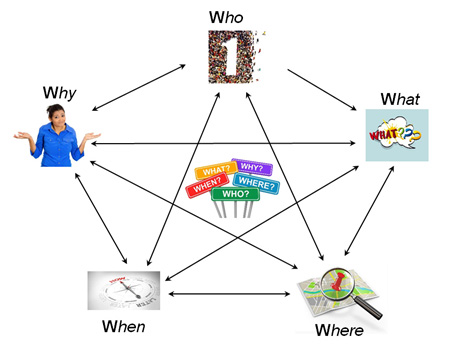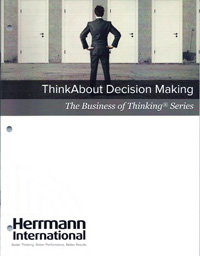

HBDI® THINK ABOUT DECISION-MAKING:

By participating in the HBDI Think About Decision-Making Workshop, participants will uncover how to use Whole Brain© Thinking as individuals in their decision-making process and how to work in teams for more effective collaborative decision-making. They will learn how to communicate their preferences, receive input from a team with a diverse preference composite, and fuse all four quadrants into a brainstorming plan of action to handle decision-making in a Whole Brain© manner.
THIS IS A WORKSHOP FOR THE POSITIVE APPLICATION OF GREAT DECISION-MAKING
We can help you make better Decisions by thinking smarter.
There are many examples of good decision-making practices in business. Google handles improving their management decision-making with their People Analytics Department, their Great Manager's Award, and a twice-yearly feedback survey to help revise their decision-making management-training program. Amazon integrates their site-wide decision-making recommendations into nearly every aspect of the purchasing process, from product browsing to checkout. Southwest Airlines executives are using customer data to decide what new services will be most popular with customers, and the most profitable, allowing them to offer better rates along with better customer experiences. This has led to growth in customer loyalty. Decision-making is a vital part of our culture and is a key component of every business.
One bad decision can be devastating to a company in today's economy. A clear understanding of the impact decisions have on your people, clients, and stakeholders is essential. In addition, the decision-making style which might be consensus, majority rule, or leader-selected must be balanced with Facts-vs-Intuition and Achievable Plan-vs-New Opportunities.
HBDI Think About Decision-Making is a group learning program, built on the foundation of Whole Brain® Thinking.

This program will give you and your team the Whole Brain® skills, tools, and techniques to contribute to the collective decision-making, no matter their function or role.
By the end of the session, participants will be able to: Define what it means to be an effective decision-maker using all four quadrants of the Whole Brain® Model,
There are three learning objectives; Leveraging your thinking preferences in making decisions, being mindful of aspects in your decision-making that receive less attention, and using the Whole Brain® Pre-Decision Filter to prepare yourself to make decisions. Exploring the 5-Whys of Decision-Making Exercise
To make great decisions requires having great information and relevant input from others who may be impacted. A clear understanding and exploration of the 5 W’s of decision-making allows the workshop participants a mental roadmap and process which helps to break down and organize the critical information necessary to make a balanced decision based on Whole Brain© thinking using all of your thinking quadrants. For organizations the use of the 5 W’s process will allow them to understand the unique and different points-of-view, perspectives, alternate mindsets, paradigms and mental models that exist. Only after a clear diagnostic exploration of the known and unknown facts can you create a great decision.
The workshop exercise allows a team to design and plan the fun vacation to Hawaii. Each group will get to make interconnected decisions based on which island they want to travel to, how many days they will be vacationing, the type of vacation they want to experience along with the detail decisions required for airline travel, lodging accommodations and rental car selection. This exercise introduces the participants to a 5W Decision Making template and a hands-on thinking process designed to structurally optimize your Whole Brain© decision making abilities.

• When – The timing for when this decision will happen. The timeline or schedule for the event(s) or actions that must occur. Can be broken down into milestones, goals or day/dates.
• What – The details of the decision. The background facts, data, feelings and plans. The essence of the decision based on the current information, points of views and known perspectives.
• Where – The location that is effected or impacted by the decision. The group, team or collection of people and where they are located.
• Why – Review and provide the justification or reason that the decision is being made. The importance or impact of making the decision or not making the decision.
Utilizing the 5 W’s decision-making process creates an interconnected Whole Brain© evaluation that when demonstrated and practiced provides a new skill set essential to everyone who participates.

Participants who attend this workshop will recieve a copy of the ThinkAbout Creative Thinking Workbook.

For information on cost and event booking, email RPLC
